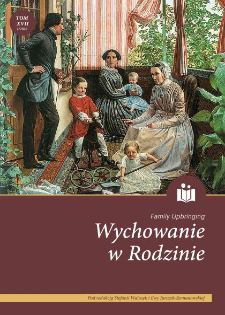Kulturowe doświadczanie młodego pokolenia w polskich rodzinach na wileńskim styku kultur
Cultural experience of the young generation in Polish families in the Vilnius cultural borderland
Author(s): Alicja SzerlągSubject(s): History, Social Sciences, Education, Sociology, Social history
Published by: Zakład Historii Edukacji w Instytucie Pedagogiki Uniwersytetu Wrocławskiego
Keywords: family home; identity; cultural space of the family; dimensions of the cultural identification
Summary/Abstract: Family home, as a place of significance for the young generation, plays a key part in the process of creating their identity. Family is the first environment of the experience for a child, also the cultural one. It is thanks to its culture-generating role that the child becomes a part of the culture of own family (nurtured and developed from generationto generation), the national culture, the general social, or the community cultures that the family members are part of. Thus, a unique cultural space is created where the child gathers experiences, getting to know the specificity of a given culture and makes choices, so that finally the cultural self-identification can take place during the process of shaping own identity. Such cultural identifications are multidimensional in the cultural borderland, as proved within these reflections. Aim. The aim of this study was to define the specificity of the cultural experiences of the young generation of Poles in the Vilnius cultural borderland, in particular regarding their cultural identifications in family environment. Method. The research exploration, concerning the above outlined issues, was carried out with the application of the method of diagnostic survey. Results. The research embraced 106 teenagers coming from Polish families, and livingin the Vilnius region. Relying on the conclusions from own research, carried out amongst the young generation of Poles living in the Vilnius area, a conceptualisation of the cultural space of the family in a borderland took place, followed by the distinction of its primary dimensions, i.e. the extant, succeeded and accomplished. With reference to each of the latter the author described generating factors that are of key importance in the process of the cultural identification of the young generation functioning in the cultural borderland. On such grounds the conclusions tackled not only the cultural orientations of the researched, butequally their cultural capital with regards to the process of establishing a community in the multicultural environment. For the latter, the culture of the borderland proves to function as a point of reference, entailing cross-cultural and cross-national features.
Journal: Wychowanie w Rodzinie
- Issue Year: XVII/2018
- Issue No: 1
- Page Range: 157-169
- Page Count: 13
- Language: English, Polish

